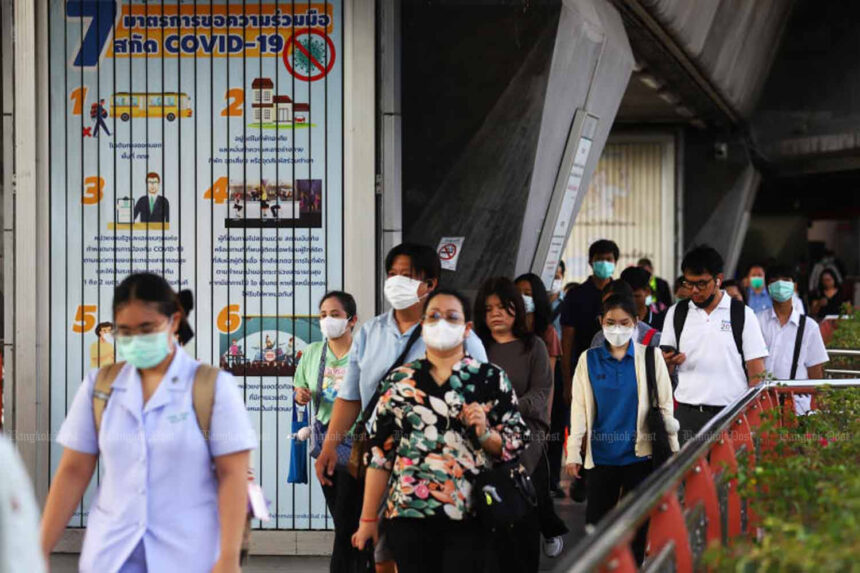BANGKOK -XEV Variant COVID-19 cases in Thailand have soared, with the Department of Disease Control’s Division of Epidemiology recording as many as 20,000 new infections in a single day. Most cases are in Bangkok, where outbreaks are growing fast.
The XEC variant, a new and highly contagious Omicron subvariant, is spreading much quicker than seasonal flu and is causing concern among health officials. With cases rising, public health experts stress the need to understand XEC and stick to strong safety practices, especially for those at higher risk.
Understanding the XEC Variant
The XEC variant first appeared in Germany in June 2024 and developed from a mix of two Omicron subvariants, KS.1.1 (FLiRT) and KP.3.3 (FLuQE). It carries several genetic changes that allow it to spread more efficiently. In early May 2025, XEC Variant made up about 3.07% of cases in Thailand, lower than before but still a key factor in the current surge.
Worldwide, over 550 XEC sequences have been found in 27 countries, and reports from the US, UK, and China show it spreads up to twice as quickly as earlier Omicron strains. In some areas, it now accounts for up to 20% of new infections.
While XEC moves rapidly through the population, it has not led to more severe illness. The death rate remains low at 0.02%, helped by widespread vaccination and easy access to antivirals. Still, the speed of its spread threatens people at greater risk, such as older adults, those with long-term illnesses, and pregnant women, known in Thailand as the “608 group.”
Since January 2025, Thailand has seen 324,692 COVID-19 cases and 69 deaths, with seniors making up 80% of those lost. Children under five and adults aged 20–39 are also seeing high infection rates, with Bangkok, Chon Buri, Rayong, Phuket, and Nakhon Pathom showing the largest case numbers.
Holidays and school reopenings have added fuel to the fire. Songkran celebrations in April led to packed gatherings and more travel, helping the virus jump from person to person.
The start of the rainy season and students returning to classrooms have led to more clusters, especially in crowded cities. Dr. Jurai Wongsawat from the Department of Disease Control pointed out that XEC Variant’s speed, combined with busy social events, has made stopping its spread even harder.
Bangkok at the Centre of the Surge
Bangkok, a busy and crowded city, is at the heart of the current outbreak. Between 18–24 May, officials logged 9,539 cases in Bangkok alone. Infections have been found in schools, prisons, construction camps, and hospitals. The city’s health teams are working quickly to contain outbreaks by visiting affected sites and putting special measures in place.
The city’s dense population and active nightlife make it easy for the virus to spread. Some schools, like Ratwinit Bangkaeo School in nearby Samut Prakan, have switched back to online classes. Health workers urge everyone to take extra care. Dr. Thira Woratanarat from Chulalongkorn University’s Faculty of Medicine said the number of cases has climbed for 11 straight weeks. This rise goes against earlier reports from the Ministry of Public Health, which had claimed the outbreak was under control.
How to Lower the Risk of Infection
Even though COVID-19 XEC Variant symptoms are generally milder, it spreads quickly. Thailand’s health authorities have given clear, practical advice:
- Wear masks in busy or enclosed places. Well-fitted N95 or KN95 masks offer the best protection.
- Wash hands often with soap and water, or use alcohol gel, especially after touching things in public.
- Keep a safe distance from others, particularly in crowded or high-risk areas. Stay away from people who are coughing or look unwell.
- Make sure all vaccinations are up to date. Booster doses are important, especially for older people or anyone with health problems. Speak with a doctor to check your vaccine schedule.
- Look out for symptoms like fever, cough, loss of taste or smell, trouble breathing, or tiredness. If symptoms appear, take a rapid antigen test and avoid contact with others.
- Limit visits to or gatherings with elderly people or those with chronic conditions. If you must meet, wear masks and make sure the room is well ventilated.
Public Health Minister Somsak Thepsuthin remains focused on protecting people most at risk. More resources are being sent to look after the 608 group and to keep schools safe. He insists that, while deaths are low, the high speed of XEC infections makes it vital for everyone to stay alert.
What’s Thailand Doing?
Thailand’s Covid-19 fight is not finished. The XEC variant proves that the virus can still surprise health authorities and communities. The Department of Medical Sciences is watching for new changes in the virus and working with labs to prepare for further outbreaks. While the JN.1 variant remains the most common, XEC and other subvariants like LP.8.1 are a reminder to keep monitoring and stay flexible.
Officials encourage everyone to stay calm and follow public health guidance. Dr. Yongyuth Thammawut, Director-General of the Department of Medical Sciences, says most XEC cases are mild, but basic measures like vaccination and mask-wearing are still the best way to slow the spread. As the country faces another wave, teamwork and following the rules will help protect communities and keep hospitals from getting overwhelmed.
For reliable updates, residents should look out for statements from the Department of Disease Control and local health offices. The message remains the same across Thailand: keep informed, stick to safety basics, and look after each other.
Sources: Bangkok Post, Nation Thailand














